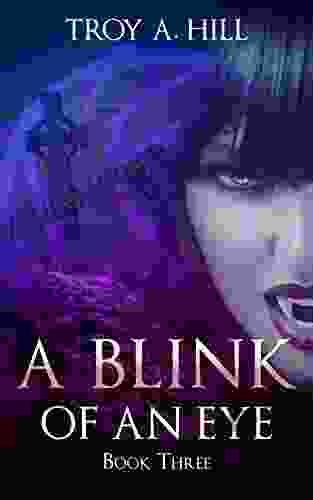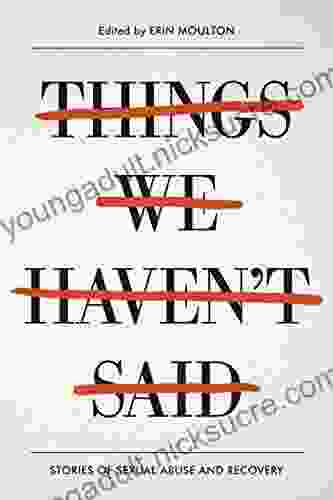The Blink of an Eye: How Fast Do We Really Perceive the World?

4.5 out of 5
| Language | : | English |
| File size | : | 2307 KB |
| Text-to-Speech | : | Enabled |
| Screen Reader | : | Supported |
| Enhanced typesetting | : | Enabled |
| Word Wise | : | Enabled |
| Print length | : | 326 pages |
| Lending | : | Enabled |
We all know that our eyes are constantly sending information to our brains. But how fast does our brain actually process this information? And how does this processing speed affect the way we perceive the world around us?
In this article, we'll explore the science of visual perception and learn about the amazing speed at which our brains process visual information. We'll also discuss how this processing speed affects our ability to see the world in real time, and how it can sometimes lead to illusions and other perceptual errors.
How Fast Do We See the World?
The speed at which we perceive the world is determined by a number of factors, including the speed of light, the speed of our neural processing, and the time it takes for our brains to interpret the information that we receive from our eyes.
The speed of light is the fastest speed at which anything can travel. When we look at an object, the light from that object travels to our eyes at a speed of 186,000 miles per second. Once the light reaches our eyes, it is converted into electrical signals that are then sent to our brains.
The speed of our neural processing is also very fast. Once the electrical signals from our eyes reach our brains, they are processed by a number of different neurons. These neurons work together to create a representation of the world around us. This process is incredibly fast, and it takes place in just a few milliseconds.
The time it takes for our brains to interpret the information that we receive from our eyes is also very fast. Once the neurons in our brains have created a representation of the world around us, our brains must then interpret this information. This process involves a number of different cognitive processes, including pattern recognition, object recognition, and scene understanding. These processes are also very fast, and they take place in just a few milliseconds.
So, how fast do we actually perceive the world? The answer is that we perceive the world in real time. The speed of light, the speed of our neural processing, and the time it takes for our brains to interpret the information that we receive from our eyes all work together to allow us to see the world around us in real time.
How Does This Processing Speed Affect the Way We See the World?
The speed at which we perceive the world has a number of different effects on the way we see the world around us. For example, it allows us to:
- See the world in real time
- Detect and respond to danger quickly
- Make sense of the world around us
- Experience the world in a rich and detailed way
Our ability to see the world in real time is essential for our survival. If we could not see the world in real time, we would not be able to avoid danger or to interact with the world around us in a meaningful way.
Our ability to detect and respond to danger quickly is also essential for our survival. If we could not detect and respond to danger quickly, we would be more likely to be injured or killed. For example, if we could not see a car coming towards us, we would not be able to move out of the way in time.
Our ability to make sense of the world around us is also essential for our survival. If we could not make sense of the world around us, we would not be able to find food, water, or shelter. For example, if we could not recognize a tree, we would not be able to tell if it was safe to eat the fruit from that tree.
Our ability to experience the world in a rich and detailed way is also essential for our well-being. If we could not experience the world in a rich and detailed way, our lives would be much more boring and less fulfilling. For example, if we could not see the colors of the sunset, we would not be able to appreciate its beauty.
How Can This Processing Speed Sometimes Lead to Illusions and Other Perceptual Errors?
The speed at which we perceive the world can sometimes lead to illusions and other perceptual errors. For example, if we look at a spinning wheel, we may see it spinning in the opposite direction. This is because our brains are trying to process the information from our eyes too quickly. As a result, our brains may make a mistake and interpret the information incorrectly.
Perceptual errors can also be caused by other factors, such as fatigue, stress, and drugs. For example, if we are tired, we may be more likely to see things that are not there. This is because our brains are not able to process information as quickly when we are tired.
Illusions and other perceptual errors are a reminder that our perception of the world is not always perfect. However, these errors are also a testament to the amazing speed at which our brains process visual information.
The speed at which we perceive the world is truly amazing. Our brains are able to process visual information incredibly quickly, which allows us to see the world in real time, detect and respond to danger quickly, make sense of the world around us, and experience the world in a rich and detailed way. However, this processing speed can sometimes lead to illusions and other perceptual errors. These errors are a reminder that our perception of the world is not always perfect. However, they are also a testament to the amazing speed at which our brains process visual information.
4.5 out of 5
| Language | : | English |
| File size | : | 2307 KB |
| Text-to-Speech | : | Enabled |
| Screen Reader | : | Supported |
| Enhanced typesetting | : | Enabled |
| Word Wise | : | Enabled |
| Print length | : | 326 pages |
| Lending | : | Enabled |
Do you want to contribute by writing guest posts on this blog?
Please contact us and send us a resume of previous articles that you have written.
 Fiction
Fiction Non Fiction
Non Fiction Romance
Romance Mystery
Mystery Thriller
Thriller SciFi
SciFi Fantasy
Fantasy Horror
Horror Biography
Biography Selfhelp
Selfhelp Business
Business History
History Classics
Classics Poetry
Poetry Childrens
Childrens Young Adult
Young Adult Educational
Educational Cooking
Cooking Travel
Travel Lifestyle
Lifestyle Spirituality
Spirituality Health
Health Fitness
Fitness Technology
Technology Science
Science Arts
Arts Crafts
Crafts DIY
DIY Gardening
Gardening Petcare
Petcare Gary B Meisner
Gary B Meisner Daddilife Books
Daddilife Books Robert Lindsay
Robert Lindsay Phil Burt
Phil Burt Roland A Boucher
Roland A Boucher Patrick M Lencioni
Patrick M Lencioni Matt Vincent
Matt Vincent Nicholas Jubber
Nicholas Jubber Sandra Steingraber
Sandra Steingraber Seth Lloyd
Seth Lloyd Catherine Mccord
Catherine Mccord Sir Edmund Hillary
Sir Edmund Hillary United States Government Us Army
United States Government Us Army Peter Townsend
Peter Townsend George Noory
George Noory Daniel Friedmann
Daniel Friedmann Carol Ann Gillespie
Carol Ann Gillespie Kathy Freston
Kathy Freston Otto Rahn
Otto Rahn Joe Peta
Joe Peta Charney Herst
Charney Herst Manik Joshi
Manik Joshi Paul Cobley
Paul Cobley Alex Wolf
Alex Wolf Margaret M Quinlan
Margaret M Quinlan Tirzah Price
Tirzah Price Rodney Castleden
Rodney Castleden Kent David Kelly
Kent David Kelly Frank Deford
Frank Deford Danil Zburivsky
Danil Zburivsky Caspar Melville
Caspar Melville Michele Borba
Michele Borba Eric Schmitz
Eric Schmitz Barry Pickthall
Barry Pickthall Alberta Hawse
Alberta Hawse Joe Berardi
Joe Berardi Elly Molina
Elly Molina Marilyn Burgos
Marilyn Burgos Jenna Blough
Jenna Blough Humberto G Garcia
Humberto G Garcia Hourly History
Hourly History Robb Manning
Robb Manning Angela Leslee
Angela Leslee Miranda Green
Miranda Green Robyn Harding
Robyn Harding Guy Evans
Guy Evans Tigran Bagdasaryan
Tigran Bagdasaryan Emily Nielson
Emily Nielson Dawn Griffiths
Dawn Griffiths John Samuel Barnett
John Samuel Barnett Rebecca Serle
Rebecca Serle Bill Schneider
Bill Schneider Jules Brown
Jules Brown Yvonne Choquet Bruhat
Yvonne Choquet Bruhat Jenna Helwig
Jenna Helwig Judith Hoare
Judith Hoare Bradley Charbonneau
Bradley Charbonneau Tina Nelson
Tina Nelson Patrick Pickens
Patrick Pickens Ben Campbell
Ben Campbell D M Davis
D M Davis John Sonmez
John Sonmez Mark Verstegen
Mark Verstegen Ruth Benedict
Ruth Benedict Latonya J Trotter
Latonya J Trotter Sam Bleakley
Sam Bleakley Kristen Jervis Cacka
Kristen Jervis Cacka Thomas Golf
Thomas Golf George Megre
George Megre Lynn Lyons
Lynn Lyons Margaret Jordan Halter
Margaret Jordan Halter W Todd Woodard
W Todd Woodard Tanya Lee Stone
Tanya Lee Stone Jeffrey T Richelson
Jeffrey T Richelson Angela Thayer
Angela Thayer Angel Millar
Angel Millar Robert Kirk
Robert Kirk Violet White
Violet White Stuart Lawrence
Stuart Lawrence David Graeber
David Graeber Angelo Lowery
Angelo Lowery Jeff Fleischer
Jeff Fleischer Angel Burns
Angel Burns Robin Yocum
Robin Yocum Wynne Foster
Wynne Foster Dave Smith
Dave Smith Christopher O Kennon
Christopher O Kennon Rebecca Hemmings
Rebecca Hemmings Jim Prime
Jim Prime Steve Hindman
Steve Hindman Michael V Uschan
Michael V Uschan Jessica Wolstenholm
Jessica Wolstenholm Diana Nyad
Diana Nyad Lindsay Ford
Lindsay Ford Keylee C Hargis
Keylee C Hargis Rebecca P Cohen
Rebecca P Cohen Mirabai Starr
Mirabai Starr Angela Smith
Angela Smith Ingrid S Clay
Ingrid S Clay Mark W Steege
Mark W Steege Robyn Wideman
Robyn Wideman Patrick Ejeke
Patrick Ejeke William D Lopez
William D Lopez Keith Elliot Greenberg
Keith Elliot Greenberg Kathryn Miles
Kathryn Miles Angeline Boulley
Angeline Boulley Shenila Khoja Moolji
Shenila Khoja Moolji Mary Pipher
Mary Pipher Mark J Musser
Mark J Musser Elizabeth Hunter
Elizabeth Hunter Joshua Clark
Joshua Clark Walter Beede
Walter Beede Greg Prato
Greg Prato Angela C Wu
Angela C Wu Howell Raines
Howell Raines Sandy Tolan
Sandy Tolan Joseph Mazur
Joseph Mazur William E Hearn
William E Hearn Jay Griffiths
Jay Griffiths Angela Stancar Johnson
Angela Stancar Johnson Jerry Toner
Jerry Toner Jonathan Gottschall
Jonathan Gottschall Margaret Visser
Margaret Visser Roger Craig
Roger Craig Kim Foley Mackinnon
Kim Foley Mackinnon Matthew D Dewar
Matthew D Dewar Karen Elliott House
Karen Elliott House Emiko Jean
Emiko Jean Michael Anthony
Michael Anthony Dave Gray
Dave Gray Beth A Leonard
Beth A Leonard Jessica Nordell
Jessica Nordell Ryan D Agostino
Ryan D Agostino Germano Dalcielo
Germano Dalcielo Chris Santella
Chris Santella Robert Dudley
Robert Dudley Karl Beecher
Karl Beecher Israelin Shockness
Israelin Shockness Cynthia Nims
Cynthia Nims Dave Duncan
Dave Duncan Robin Ray Green
Robin Ray Green Tara Sim
Tara Sim Alessio Mangoni
Alessio Mangoni Nick Bradley
Nick Bradley Stephen Grossberg
Stephen Grossberg Sharon Strand Ellison
Sharon Strand Ellison Bret A Moore
Bret A Moore John B Nici
John B Nici Wayne Mcghie
Wayne Mcghie Ed Stafford
Ed Stafford Richard G Brown
Richard G Brown Ryan Bow
Ryan Bow Nikki Ace
Nikki Ace Andy Dowsett
Andy Dowsett George Johnson
George Johnson Ashley P Martin
Ashley P Martin Kristen S Kurland
Kristen S Kurland James M Johnston
James M Johnston L S Boos
L S Boos Jay Matthews
Jay Matthews Rafael Gordillo Naranjo
Rafael Gordillo Naranjo Elizabeth Foss
Elizabeth Foss Andy Jurinko
Andy Jurinko Jordan Summers
Jordan Summers S L Macgregor Mathers
S L Macgregor Mathers Christian Wiggins
Christian Wiggins Jenny Smith
Jenny Smith Rashaun Johnson
Rashaun Johnson Mtg Editorial Board
Mtg Editorial Board Charlotte Klaar Phd
Charlotte Klaar Phd Jonah Lehrer
Jonah Lehrer Cate Tiernan
Cate Tiernan Jim Posewitz
Jim Posewitz Chris Chelios
Chris Chelios Bob Gordon
Bob Gordon Laura Bogen
Laura Bogen Muako Maepa
Muako Maepa Donald N Yates
Donald N Yates Rachel Kowert
Rachel Kowert Liv Ryan
Liv Ryan Judith S Beck
Judith S Beck Scott Meyer
Scott Meyer Andy Peloquin
Andy Peloquin Stephen Cheney
Stephen Cheney Oliver Burkeman
Oliver Burkeman Shane O Mara
Shane O Mara Derek M Steinbacher
Derek M Steinbacher Gillian Price
Gillian Price Lynn Palm
Lynn Palm Carlo Rovelli
Carlo Rovelli Mark Remy
Mark Remy Teresa Parker
Teresa Parker Lee Cronk
Lee Cronk Eliot Schrefer
Eliot Schrefer John C Maxwell
John C Maxwell Pete Dunne
Pete Dunne Schoolhouse Heaven
Schoolhouse Heaven Rachel Connelly
Rachel Connelly Joy Williams
Joy Williams Keith Crowley
Keith Crowley Neveen Musa
Neveen Musa Joel J Lerner
Joel J Lerner Samir P Desai
Samir P Desai Bob Swope
Bob Swope Avinash Navlani
Avinash Navlani Dan Ariely
Dan Ariely Mitch Horowitz
Mitch Horowitz Rob Willson
Rob Willson Colby Coombs
Colby Coombs Jeffrey Thurston
Jeffrey Thurston Ron Jeffries
Ron Jeffries Jeremy Klaff
Jeremy Klaff Rebecca Solnit
Rebecca Solnit David C Keehn
David C Keehn Ashley Rickards
Ashley Rickards George E Hein
George E Hein Robert Urban
Robert Urban Thais Nye Derich
Thais Nye Derich Marc Charles
Marc Charles Madeleine Roux
Madeleine Roux William Ayers
William Ayers Andy Crowe
Andy Crowe Diana Winston
Diana Winston Tim Hannigan
Tim Hannigan Fredrik Backman
Fredrik Backman Nicholas Epley
Nicholas Epley Tom Dymond
Tom Dymond Scott Alan Johnston
Scott Alan Johnston Viviana Altuve
Viviana Altuve Sabbithry Persad Mba
Sabbithry Persad Mba R E Burrillo
R E Burrillo Mercedes Pollmeier
Mercedes Pollmeier Tom Allen
Tom Allen Irene Gut Opdyke
Irene Gut Opdyke Kelly Corrigan
Kelly Corrigan Tristan Higbee
Tristan Higbee Jane M Healy
Jane M Healy Kari Marie Norgaard
Kari Marie Norgaard Sylvester Nemes
Sylvester Nemes Richard Lemaster
Richard Lemaster Julia Reed
Julia Reed Chef Maggie Chow
Chef Maggie Chow Emily Souder
Emily Souder Christopher Nyerges
Christopher Nyerges Donald R Prothero
Donald R Prothero Massimo Florio
Massimo Florio Ray Walker
Ray Walker Arlin Smith
Arlin Smith Bob Clouser
Bob Clouser Lawrence Goldstone
Lawrence Goldstone Dhonielle Clayton
Dhonielle Clayton Dean Beaumont
Dean Beaumont Shalabh Aggarwal
Shalabh Aggarwal Anna Rashbrook
Anna Rashbrook Linda Sivertsen
Linda Sivertsen Andy Farrell
Andy Farrell Stephen Jungmann
Stephen Jungmann Emma Dalton
Emma Dalton Tovah Feldshuh
Tovah Feldshuh Frederick Aardema
Frederick Aardema Angelina J Steffort
Angelina J Steffort Harold S Koplewicz
Harold S Koplewicz Milton Roth
Milton Roth David Goodman
David Goodman Meg Long
Meg Long Jason Hogan
Jason Hogan Mark Rosenman
Mark Rosenman Donna Helen Crisp Jd Msn Rn Pmhcns Bc
Donna Helen Crisp Jd Msn Rn Pmhcns Bc Douglas Henderson Jr
Douglas Henderson Jr Joan Jacobs Brumberg
Joan Jacobs Brumberg Jodi Shabazz
Jodi Shabazz Marie Brennan
Marie Brennan Lutz Hanseroth
Lutz Hanseroth Rachel Hutt Phd
Rachel Hutt Phd Nicholas D Kristof
Nicholas D Kristof Erin Moulton
Erin Moulton Eli Wilson
Eli Wilson Ruby Lang
Ruby Lang Tea Rozman Clark
Tea Rozman Clark Mark Lester
Mark Lester Belinda Norton
Belinda Norton Tania N Shah
Tania N Shah Mark Kernion
Mark Kernion Susan Burton
Susan Burton Kevin Thomas
Kevin Thomas Dr Eva Beaulieu
Dr Eva Beaulieu Stefan Hunziker
Stefan Hunziker Peter Gibson
Peter Gibson Barak Ariel
Barak Ariel Eugene P Northrop
Eugene P Northrop Robert E Stake
Robert E Stake Michael Driscoll
Michael Driscoll Wendy Rosenoff
Wendy Rosenoff Mark Shepherd
Mark Shepherd Mandee Heller Adler
Mandee Heller Adler T L Payne
T L Payne Howard Davis
Howard Davis Afra J Zomorodian
Afra J Zomorodian Harry Fairhead
Harry Fairhead Chuck Weikert
Chuck Weikert Rebecca Eanes
Rebecca Eanes Stacy Mccullough
Stacy Mccullough Petros Efthymiou
Petros Efthymiou Tim Macwelch
Tim Macwelch Stewart Shapiro
Stewart Shapiro Sam Fury
Sam Fury T R Fehrenbach
T R Fehrenbach Robin Benway
Robin Benway Caryl Say
Caryl Say Deborah Wall
Deborah Wall Ben Ehrenreich
Ben Ehrenreich Andy Puddicombe
Andy Puddicombe Mike Chambers
Mike Chambers Jim Saccomano
Jim Saccomano William Bryant Logan
William Bryant Logan Mark Wells
Mark Wells Ron Douglas
Ron Douglas Rufus Estes
Rufus Estes Murtaza Haider
Murtaza Haider Lisa Preston
Lisa Preston M J Fievre
M J Fievre Kevin J Gaston
Kevin J Gaston Cory Mortensen
Cory Mortensen Jeff Mach
Jeff Mach Johnny Molloy
Johnny Molloy Rebecca Boggs Roberts
Rebecca Boggs Roberts Lisa Marie Mercer
Lisa Marie Mercer Chip Heath
Chip Heath Joyce Yang
Joyce Yang Marie Myung Ok Lee
Marie Myung Ok Lee Madison Lee
Madison Lee Jennifer Bohnet
Jennifer Bohnet John Geiger
John Geiger Scott Stillman
Scott Stillman Aaron Wilson
Aaron Wilson Cap N Fatty Goodlander
Cap N Fatty Goodlander Kim West
Kim West Andy Schell
Andy Schell Jeffrey Lee
Jeffrey Lee Tj Faultz
Tj Faultz Connie Schultz
Connie Schultz David Kinney
David Kinney Mometrix
Mometrix Elizabeth Kaledin
Elizabeth Kaledin Dennis Rainey
Dennis Rainey Rosie Daley
Rosie Daley Devaki Lakshmi
Devaki Lakshmi Adam Skolnick
Adam Skolnick Ariel Henley
Ariel Henley David E Jones
David E Jones David Herres
David Herres Dwight E Neuenschwander
Dwight E Neuenschwander Ryan Beck
Ryan Beck Tim O Connor
Tim O Connor Rodney Paul
Rodney Paul Johnson Egonmwan
Johnson Egonmwan Laura Hillman
Laura Hillman Janet Menzies
Janet Menzies Christian Heath
Christian Heath Cheryl Alkon
Cheryl Alkon Stephen Rea
Stephen Rea Scott Turner
Scott Turner Robert Zubek
Robert Zubek Richard Lee Byers
Richard Lee Byers Natalie Rhodes
Natalie Rhodes Peter Finch
Peter Finch G K Derosa
G K Derosa Tovar Cerulli
Tovar Cerulli Jeanne Godfrey
Jeanne Godfrey Erich Fromm
Erich Fromm Ted Sandling
Ted Sandling Christina Hillsberg
Christina Hillsberg Kristina Statler
Kristina Statler Jessica Jung
Jessica Jung Ken Dryden
Ken Dryden Jo May
Jo May Richard Hibshman
Richard Hibshman Lidia Bastianich
Lidia Bastianich Ellen Frank
Ellen Frank Angelo Tropea
Angelo Tropea Richard Bate
Richard Bate Nathaniel Rich
Nathaniel Rich Siena Cherson Siegel
Siena Cherson Siegel Richard L Sites
Richard L Sites Kyle Graves
Kyle Graves Leonard Lueras
Leonard Lueras Donna Mott
Donna Mott Ellen J Langer
Ellen J Langer Andy Mitchell
Andy Mitchell Kim Dragoner
Kim Dragoner Raynor Winn
Raynor Winn Jorge Ramos Mizael
Jorge Ramos Mizael Karl E Peace
Karl E Peace Kenneth R Ginsburg
Kenneth R Ginsburg Tim Thayne
Tim Thayne Tim Larkin
Tim Larkin Karen Sternheimer
Karen Sternheimer Baby Professor
Baby Professor Joseph Phillips
Joseph Phillips Lucy Postgate
Lucy Postgate Angelo Chiari
Angelo Chiari Ben Bleiweiss
Ben Bleiweiss Andy Tyson
Andy Tyson Rawdon Wyatt
Rawdon Wyatt K Moriyasu
K Moriyasu Kathy Hoopmann
Kathy Hoopmann Michael Tomasello
Michael Tomasello Rod Powers
Rod Powers Yuu Tanaka
Yuu Tanaka Warren St John
Warren St John Samuel B Green
Samuel B Green Andrea Lankford
Andrea Lankford Richard A Muller
Richard A Muller Tom Chatfield
Tom Chatfield Dan Heath
Dan Heath Leanne Ely
Leanne Ely J D Swanson
J D Swanson Thomas Gilovich
Thomas Gilovich Angela Eckhoff
Angela Eckhoff Carlos Acevedo
Carlos Acevedo Bernd Heinrich
Bernd Heinrich Lois A Ritter
Lois A Ritter Bradley T Erford
Bradley T Erford Pete Sampras
Pete Sampras Hajime Isayama
Hajime Isayama Kat Anderson
Kat Anderson James Quinn
James Quinn Gregory J Davenport
Gregory J Davenport Mark Synnott
Mark Synnott Florian Freistetter
Florian Freistetter Katrina Cope
Katrina Cope Third Edition Kindle Edition
Third Edition Kindle Edition Nicole Smith
Nicole Smith Lin Wellford
Lin Wellford Jodi Picoult
Jodi Picoult Miles Olson
Miles Olson Shreya Ramachandran
Shreya Ramachandran Chanel Craft Tanner
Chanel Craft Tanner Warren Sande
Warren Sande Robyn Ryle
Robyn Ryle Stefanie K Johnson
Stefanie K Johnson Troy A Hill
Troy A Hill Tiara Mcclure
Tiara Mcclure Jamie Kuykendall
Jamie Kuykendall Gerard Siggins
Gerard Siggins Capn Fatty Goodlander
Capn Fatty Goodlander Louis Martin
Louis Martin Rick Vaive
Rick Vaive Stephen Lynch
Stephen Lynch Stephanie Land
Stephanie Land Christina Reese
Christina Reese Neil Hawkesford
Neil Hawkesford Jeffrey Bernstein
Jeffrey Bernstein Forrest Maready
Forrest Maready Martin Volken
Martin Volken Kate Le Roux
Kate Le Roux Judea Pearl
Judea Pearl Serena B Miller
Serena B Miller Jon Ronson
Jon Ronson Brian Cain
Brian Cain Kevin Hunter
Kevin Hunter
Light bulbAdvertise smarter! Our strategic ad space ensures maximum exposure. Reserve your spot today!
 Dan BellFollow ·11.9k
Dan BellFollow ·11.9k Edgar CoxFollow ·17.5k
Edgar CoxFollow ·17.5k Dale MitchellFollow ·12.7k
Dale MitchellFollow ·12.7k Russell MitchellFollow ·12.8k
Russell MitchellFollow ·12.8k Philip BellFollow ·14.3k
Philip BellFollow ·14.3k Luke BlairFollow ·15.3k
Luke BlairFollow ·15.3k Hassan CoxFollow ·12.7k
Hassan CoxFollow ·12.7k Jason HayesFollow ·14.1k
Jason HayesFollow ·14.1k

 Devon Mitchell
Devon MitchellDelve into the Comprehensive World of Cartridges: A...
In the realm of firearms, cartridges stand...
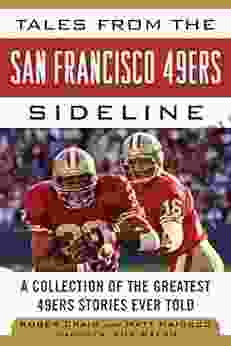
 Joseph Conrad
Joseph ConradTales From The San Francisco 49ers Sideline: A Look...
The San Francisco 49ers are one of the most...

 Ervin Bell
Ervin BellArcGIS Desktop 10: A Comprehensive GIS Tutorial for...
Geographic information...

 Reed Mitchell
Reed MitchellPhysiology Pretest Self Assessment And Review 14th...
Accurately gauge your physiology knowledge and...
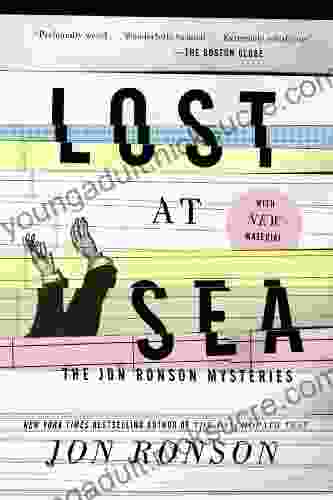
 Devin Ross
Devin RossLost At Sea: The Unbelievable True Story of the Jon...
In 2009, journalist Jon Ronson set out to...
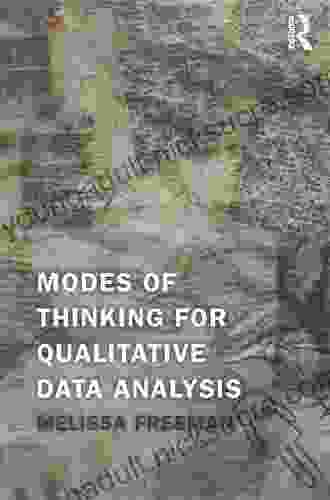
 Shane Blair
Shane BlairModes of Thinking for Qualitative Data Analysis
Qualitative data analysis is a complex...
4.5 out of 5
| Language | : | English |
| File size | : | 2307 KB |
| Text-to-Speech | : | Enabled |
| Screen Reader | : | Supported |
| Enhanced typesetting | : | Enabled |
| Word Wise | : | Enabled |
| Print length | : | 326 pages |
| Lending | : | Enabled |


